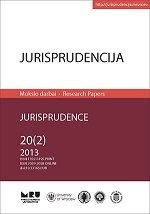Diplomatinė gynyba ir klausimai, susiję su valstybių teisių perėmimu
Diplomatic Protection and Questions Related to Succession of States
Author(s): Birutė Kunigėlytė-ŽiūkienėSubject(s): Law, Constitution, Jurisprudence
Published by: Mykolas Romeris University
Keywords: diplomatic protection; succession of states; predecessor state; successor state; international responsibility
Summary/Abstract: Succession of states regains its importance in current geopolitical situation as now we are witnessing a possible new wave of state succession: South Sudan has been accepted to the United Nations, Kosovo’s independence has been recognized by many countries, Palestine has gained new status in the United Nations, etc. This would lead to the necessity to resolve questions related to succession of states, which might, among other subjects, include issues of diplomatic protection which was subject to international legislation – International Law Commission has prepared the Draft Articles on Diplomatic Protection. However, General Assembly is still not ready to adopt this document as a convention, therefore the term to consider possible ways of handling the issues on diplomatic protection within the UN was extended till 2013. Draft articles give the definition of diplomatic protection, indicating the main features of this institute. However, sometimes the difference among the institutes being called the same name with diplomatic protection might cause misunderstandings when analyzing the issue both in general and in the context of succession of states. One of the main prerequisites for diplomatic protection recognized in the jurisprudence of International Court of Justice is the Mavrommatis rule, which indicates that when protecting the citizen’s rights, state in reality is asserting its own right. This rule has been cited in other cases, however, especially now, when individuals already have quite a number of measures to protect their individual rights independently from the actions of state, it has been acknowledged that the rule is fictitious. This recognition, reflected in the Draft Articles and indicated in the commentary of it, is most welcomed as it helps to resolve questions related to the succession of states. There is a need to understand that there is a difference between international obligations under which state is entitled to diplomatic protection and those under which it really asserts its own rights, despite the fact that the latter might also be related to the rights of individuals. This difference is also important in the context of the succession of states, as the consequences arising out of the breach of these obligations in the context of state succession might differ. The last but not least issue addressed in the article is the question of the succession to treaties, which indicate individual rights, but does not form a customary international law. The question is whether the successor state is entitled to diplomatic protection on behalf of its succeeded citizen in a case of a breach of international treaty which was not subject to succession by the successor state. Taking everything into account, there are issues which are not addressed in the Draft Articles on Diplomatic Protection. Herewith there are issues of diplomatic protection which should be addressed in a case of state succession. Nonetheless, it should be reminde
Journal: Jurisprudencija
- Issue Year: 20/2013
- Issue No: 2
- Page Range: 591-609
- Page Count: 19
- Language: Lithuanian

